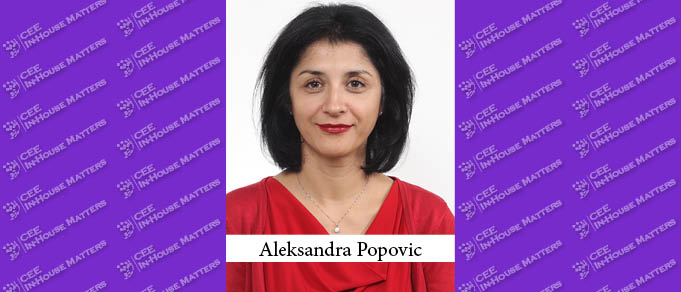Aleksandra Popovic, Director of Legal Affairs Serbia and Macedonia at Atlantic Grupa, describes the digitalization process at her company and its impact on the legal function.
The world around us is becoming increasingly digital, and digitalization represents one of the primary means of increasing the operational efficiency of companies, through standardization based on the real needs of the company and the improvement of all business processes. In a world in which digitalization is increasingly prevalent, in-house lawyers must adapt to new trends in order to provide legal support in a more efficient and effective way. It should be borne in mind that digitalization requires certain budget funds in order to be implemented.
For the digitalization of the in-house legal department, first of all, an analysis of the operational affairs of lawyers should be performed. The idea is to free in-house lawyers from administrative tasks and paperwork, so they can devote more time to the essence of legal work. One of the most common lawyers’ jobs in companies is drafting contracts/agreements, and most companies have established procedures for drafting contracts and approving their conclusion. Atlantic Grupa has set digitalization as one of its strategic goals, and a few years ago began using Office Point, which offers electronic contract approval among its digitized processes. The digitalization of this process has allowed more people, from different operational functions in the company, to participate, simultaneously making the process shorter and more efficient. The situation of all Atlantic Grupa contracts in this register in electronic form makes them available to a larger number of people, which allows us not only to unify legal support more easily, but also to exchange good legal practices quickly and effectively.
The intellectual property database has been digitized through the Intellectual Property Register as well, allowing for the storage of registered trademarks and industrial designs. Our state also recognizes digitalization as one of its priorities. With the introduction of electronic trademark registration, the entire process from registration to archiving of trademarks has been digitized in this way, which has significantly improved the efficiency of in-house lawyers. Atlantic Stark received the Users’ Trophy Award from WIPO for the year 2020, as the home legal entity that had the largest number of international trademark applications filed.
There is a danger that, as the carriers of electronic records (ranging from video cassettes to flash drives), improves with technology, certain records may to be lost in employees’ computers, on CDs, and so on. Digitization has made data storage easier and safer. That is why we store all copyrighted works, in the form of videos and other advertising materials created during advertising campaigns of our Smoki, Bananica, Najlepse Zelje, Grand Kafa, Barcaffe, Cedevita, Donat, and Cockta brands, for which the rights have been transferred to us indefinitely in time and space, stored in Office Point –which links them to the corresponding contracts in the Contract Register. In this manner, all the intellectual property of the company is preserved in one place.
We lawyers say that we love paper. But today, when information is exchanged instantly in electronic form, and when speed is one of the important business factors, the speed and accuracy of the legal responses we give to our business colleagues requires easy and fast access to a large quantity of information. In that sense, the use of paper databases of regulations or books/logs of court practice has ceased. Its place was taken by the electronic databases of regulations, case law, and opinions of relevant state institutions. These databases have, in a sense, strengthened the role of in-house lawyers, as they reduce the frequency with which the opinions of external legal advisers need be sought, which leads to savings in the budget of legal affairs as well.
Recognizing the need to speed up the exchange of knowledge and experience, large companies are introducing the Share Point portal. Within the Share Point of Atlantic Grupa, all organizational units have their own portals, where they upload their relevant documents and information. Due to the diversity of legal systems of the countries in which Atlantic Grupa operates, we have portals at both the local and group level. At the local level, on the Share Point portal, we can easily access general enactments of all legal entities that are part of Atlantic Grupa in Serbia, contract templates, other general and individual enactments, replies we have given to the business in the field of labor relations, marketing, protection/safety, and competition, and the like, the opinions of relevant ministries and external lawyers, and so on. At the group level, we store information about things like various group policies, intellectual property, and GDPR or competition protection, in order to unify the practice, i.e., the provision of legal support within the entire company.
Thus, the day-to-day work of in-house lawyers is subtly changing. Information is easily accessible in one place, the experiences of others are at hand, and inefficiencies of administrative communication are significantly reduced. A lawyer can focus more on the law itself and on business inquiries.
And of course the business itself is also experiencing the digitalization process. Atlantic Grupa, for example, has introduced a digital monitoring system for KPI production and distribution processes. It has also introduced the “Pick by Voice” technology for commissioning goods via voice guidance, a project to introduce artificial intelligence and robots for warehousing operations, a supplier certificate digital tracking system, SAP Success Factor solutions for recruitment and digitization of recruitment, and a private cloud construction project.
Modern technology brings a lot of positive elements, but also a lot of unknowns. We are in an era where lawyers may have to learn the most, given that technology is evolving faster than regulations are changing. And we have to provide answers. We need to learn, for instance, about intellectual property protection in respect of marketing on various platforms such as Instagram and the like, to learn IT processes related to personal data protection, and to understand the various software processes that have been introduced to harmonize them with applicable law. The need for in-house lawyers to learn about modern technologies is a priority, which is itself, in part, facilitated through digitalization.
That the future of business is in digital technologies was also confirmed by the pandemic, when working from home became the norm. Modern IT solutions allow work to be done smoothly from home, regardless of the different locations of people and businesses. Working from home significantly reduces costs, so the work of an in-house lawyer is likely to look different in 2025. How? We will see what the future, and digitalization, shall bring.
By Aleksandra Popovic, Director of Legal Affairs Serbia and Macedonia at Atlantic Grupa
This article was published in issue 1.3 of CEE In-House Matters. The full edition is available here in pdf format, here in e-reader format, and here in electronic format.


